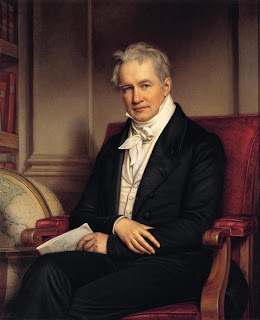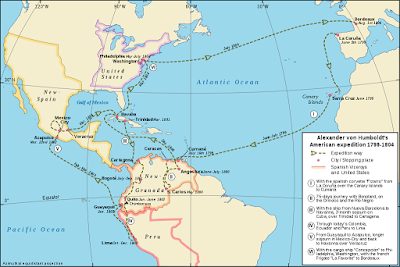 |
Engramme: Your Daily English Programme #47: Alexander von Humboldt (Listening B2-C1) |
 |
Think Before You Listen |
Who is this Nobel laureate scientist-naturalist-explorer who has been admired by Thomas Jefferson (US president), Simon Bolivar (revolutionary leader) and Charles Darwin (naturalist) among others?
 |
| Source: Wikimedia.org |
Alexander von Humboldt was born on September 14, 1769 in a Prussian family. He studied at Frankfurt, Göttingen, Hamburg and Freiburg and went on to become the most famous scientist, naturalist, and explorer of his time. The lines on the map below show the extent of his journeys from Western Europe to South and Latin America:
click to enlarge
 |
| Source: Wikimedia.org |
 |
Watch and Listen |
Watch the Video: According to the narrator, what was it that allowed Humboldt to travel as extensively as he did? Why did he go on this long journey?
 |
Let's Practice |
Listen Again: Can you put the activities and events in Humboldt's expedition in the correct order? (the first one has been done for you)
(mouse over the colored words to see their meaning)
a. He created line maps by connecting places of identical temperatures. He
called these places "isotherms".
|
|
b. He developed a theory called the "Unity of Nature," which
shows the interconnections between all parts of nature, described in his book, Cosmos.
|
|
c. He went on a 1700-mile trip, exploring the length of the Orinoco River
in Venezuela.
|
|
d. Today, Humboldt's influence is apparent everywhere and in every
scientific discipline.
|
|
e. A large inheritance allowed him the freedom to begin a five-year
scientific journey through South America.
|
1
|
f. Humboldt played a crucial role in the work of his most famous pen-pal, Charles
Darwin.
|
|
g. He climbed one of the highest volcanoes, Chimborazo in Ecuador, so that
he could record air pressure for the first time.
|
(see answers in the first comment)
 |
Over to You |
Encyclopedia.com has a very detailed but easy to read entry on Alexander von Humboldt including a complete list of his works.
Congratulations! You have successfully finished another lesson on Engramme: Your Daily English Programme. Hit the buttons below to like and share with your fellow English learners.
Review the Vocabulary from this post HERE
Download a Teacher's Copy (pdf version) for classroom use HERE
Answers to the lesson’s questions:
ReplyDelete- Humboldt was able to travel as extensively as he did thanks to a large sum of money he received in inheritance. The main purpose of his travels was to discover new places, explore world geography and learn about various aspects of nature.
a. 4 b. 5 c. 2 d. 7 e. 1 f. 6 g. 3